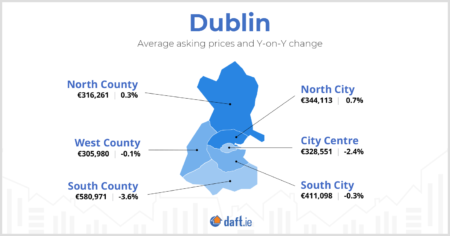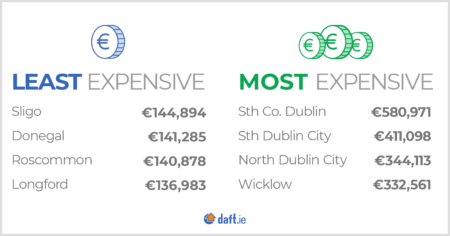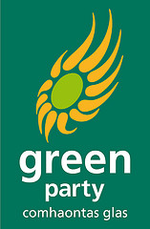22 September 2019
By Bryan Smyth
bryan@TheCork.ie
6-year house price run is at an end
In Cork City, prices in the third quarter of 2019 were 3% higher than a year previously, compared to a rise of 5% seen a year ago. The average house price is now €281,000, 71% above its lowest point. In the rest of Cork, prices in the third quarter of 2019 were 2% higher than a year previously, compared to a rise of 7% seen a year ago. The average house price is now €229,000, 60% above its lowest point.
Housing prices in the third quarter of 2019 were just 0.1% higher than a year previously, effectively marking the end of six years of rising housing prices, according to the latest Daft.ie Sales Report released today by Ireland’s largest property website, daft.ie. The average price nationwide in the third quarter of the year was €257,000, down just over €4,000 on the second quarter of the year. Compared to its lowest point in 2013, the average price nationwide is now 57% higher – but still over 30% lower than in 2007.
In Dublin, the annual inflation rate for prices has turned negative, with average prices in the capital 0.6% lower in the third quarter of 2019 than a year previously. In the other major cities, inflation is still positive, with year-on-year increases of just below 3% in Cork and Galway and roughly 5% in Limerick and Waterford cities. Outside the cities, inflation is also negative in Leinster (-1%) and Connacht-Ulster (-0.6%) but remains at 2.5% in Munster.
“With prices also falling in some areas most exposed to Brexit, in particular Border regions, a disorderly Brexit could change this story in months to come”.
The number of properties available to buy on the market nationwide was just under 25,000 in September, largely unchanged from a year ago. This breaks down differently across the country, however, with availability up year-on-year in both Dublin (1.9%) and the rest of Leinster (4.5%) but down in Munster, Connacht and Ulster by between 3% and 5%.
Commenting on the figures, Ronan Lyons, economist at Trinity College Dublin and author of the Daft.ie Report, said:
“With prices now falling in some parts of the country, there is likely to be intense debate as to whether the falls are caused by weakening demand, in particular due to Brexit, or strengthening supply. Price falls are concentrated in the Greater Dublin Area and, within that, in the most expensive markets. These are the areas least exposed to Brexit and where new supply has been concentrated. Therefore, it’s likely that cooling inflation is a good news story of supply doing its job, rather than a bad news story related to Brexit – at least for the moment. With prices also falling in some areas most exposed to Brexit, in particular Border regions, a disorderly Brexit could change this story in months to come.”
Average list price and year-on-year change – major cities, 2019 Q3
- Dublin City: €373,509 – down 0.6%
- Cork City: €281,251 – up 2.8%
- Galway City: €296,610 – up 2.9%
- Limerick City: €201,865 – up 5.5%
- Waterford City: €181,395 – up 4.7%
“Price falls are concentrated in the Greater Dublin Area and, within that, in the most expensive markets”.
Commenting on the report, Raychel O’Connell, Communications Manager at Daft.ie said: “It looks like we are finally seeing the effects of increased supply in the market. This is particularly true in Dublin where there was more than twice the number of homes for sale in mid-2019 than two years previously. This will be good news for anyone considering buying a home in the capital”.
The full report is available from http://www.daft.ie/report and includes a commentary by Ronan Lyons, Assistant Professor of Economics at Trinity College Dublin and author of the Daft.ie Report.




